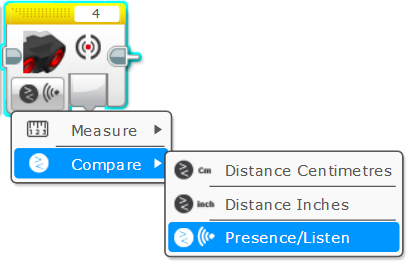Stop at given length from the wall: Difference between revisions
From wikiluntti
No edit summary |
No edit summary |
||
| Line 21: | Line 21: | ||
=== Exercises === | === Exercises === | ||
* | * Make the robot speed dependent on the distance to the wall, e.g. by using a formula speed = distance. | ||
* Use the ideas shown in previous part (Following a Line) to follow the wall at 10 cm apart. | * Use the ideas shown in previous part (Following a Line) to follow the wall at 10 cm apart. | ||
* Follow a line (previous part) until the robot finds a wall at 10 cm apart from the wall. | * Follow a line (previous part) until the robot finds a wall at 10 cm apart from the wall. | ||
Revision as of 20:16, 5 September 2020
Introduction
Robot
Any robot (with tires or treads, perhaps walking robots too) will work.
Sensors
The ultrasonic (distance) sensor is used.
Example Videos
Theory
The ultrasonic sensor is a sonar radar that works similar to the bats. You should check the performance of the sensor specially if it is not working properly. A hand might be a not optimal device for checking -- You should use something harder, eg. plastic of cardboad. The maximum working distance is about 2 meters, and the smallest distance is about 10 cm.
Example Code
Exercises
- Make the robot speed dependent on the distance to the wall, e.g. by using a formula speed = distance.
- Use the ideas shown in previous part (Following a Line) to follow the wall at 10 cm apart.
- Follow a line (previous part) until the robot finds a wall at 10 cm apart from the wall.
- If you have multiple robots, make the robots follow a line and each others, not colliding with the robot in front of.
- Use the ultrasonic sensor to listen if there is other robots using ultrasonic sensors.
This course is supported by Meet and Code. The course is made in collaboration with Robotiikka- ja tiedekasvatus ry.

